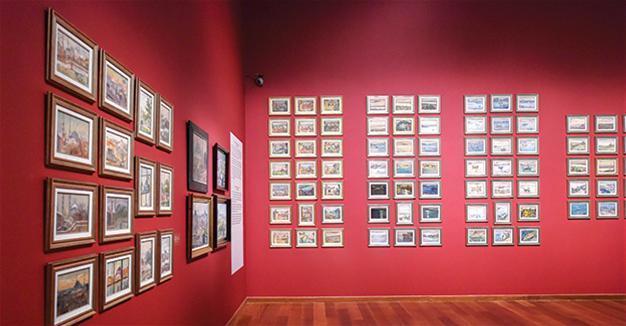Istanbul’s Sabancı Museum celebrates 15th year with Feyhaman Duran exhibition
ISTANBUL
 To celebrate its 15th anniversary, the Sabancı University Sakıp Sabancı Museum (SSM) in Istanbul presents a new exhibition “Feyhaman Duran: Between Two Worlds,” featuring work spanning the Ottoman and Republican eras.
To celebrate its 15th anniversary, the Sabancı University Sakıp Sabancı Museum (SSM) in Istanbul presents a new exhibition “Feyhaman Duran: Between Two Worlds,” featuring work spanning the Ottoman and Republican eras.Duran’s technique carries traces of the transformation from the Ottoman Empire to the Turkish Republic, and the Sabancı Museum exhibition reveals all the clashes and the developments of the era. It reflects the influences that shaped the art of Duran, who left an empire on the brink of collapse to arrive at the home of art in Paris before returning to a country in revolutionary transformation.
Duran, greatly influenced by impressionist movement during his education in Paris, took up the habit of carrying his canvas to various spots across the city to just sit back and paint.
Duran’s landscapes of Süleymaniye, Bosphorus and Istanbul’s islands provide a comprehensive glimpse of the city’s history.
His work in the southeastern province of Gaziantep as part of the Republican People’s Party’s (CHP) “Nationwide Journeys” documents the ideological structure of the era, while revealing the extent of his talent through his use of various techniques quite different from those he uses in Istanbul.
Throughout his artistic life, Duran articulated his inner experience of amalgamating the East and the West through his paintings. Due to the demand for portraits in the early Republican years, he has been mostly known for his work in this style but he was equally proficient in other styles such as still-lives and landscapes.
In addition to his portraits, the nudes he painted during his education in Paris, landscapes in various regions and still-lives where he used Ottoman calligraphy as objects in his compositions, are included in the exhibition to present the artist’s full potential to all visitors.
Duran, an executive at the Ottoman Painters Association, became a first-hand witness to the social transformation taking place in the country with his portraits of leading politicians of the Republican era, from presidents Mustafa Kemal Atatürk and İsmet İnönü to reformist Education Minister Hasan Ali Yücel.
Still, he never completely severed his ties to the traditional Ottoman arts and lifestyle. Coming from a long line of poets and Ottoman calligraphers, his use of calligraphy in his compositions and still-lives attracted significant attention.
The compositions of the Topkapı Palace Museum’s miniatures onto the canvas, which was commissioned by the Istanbul Maritime Museum when it was first founded, and his landscapes also at the Topkapı Palace Museum demonstrates the artist’s interest in the history and the art scene of the Ottoman Empire.
The exhibition includes samples of 19th century Ottoman calligraphy understood to have been left to his wife Güzin Duran by her grandfather, the famous calligrapher Yahya Hilmi Efendi, beautifully composed inscriptions by the artist and his wife’s calligraphic pictures.
The portraits, which form a substantial part of the exhibition, are presented with a short biography of the subjects to provide visitors with a more comprehensive look to the era. Some parts of the Beyazıt home the artist shared with his wife Güzin are presented in the museum, in a style depicting the daily life and the studio of the artist.
The Sabancı Museum exhibition is the first time Duran, whose work and life show how deeply he was attached to tradition, has been subject to such a comprehensive show. The large sample of works chosen from the artist’s own collection, with additions from the museum’s collection, present a detailed look into the career of this very important artist who witnessed and shaped many of the turning points in the history of Turkish art.
















